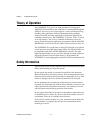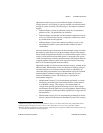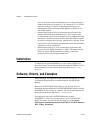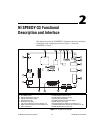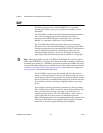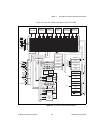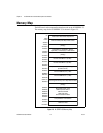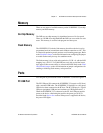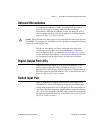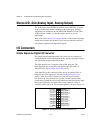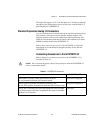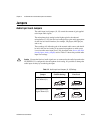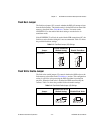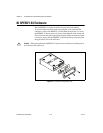
Chapter 2 NI SPEEDY-33 Functional Description and Interface
© National Instruments Corporation 2-5 NI SPEEDY-33 User Manual
Memory
There are two types of available memory on the NI SPEEDY-33, on-chip
memory and flash memory.
On-Chip Memory
The DSP uses on-chip memory for algorithms because of its fast speed.
There are 136 KB of on-chip RAM that the DSP can access with zero wait
states. This memory is used for both program and data space.
Flash Memory
The NI SPEEDY-33 includes flash memory that allows the device to be
programmed and run in standalone mode without connection to a PC. This
is essential for producing actual products or self-standing prototypes. Refer
to the Flash Boot Jumper section for information on configuring the jumper
to enable flash memory boot up for standalone mode.
The flash memory is byte-wide and organized as 512 K × 8, with the DSP
mapping it to a 512 K × 32 (2,048 KB) area, only able to read the lowest
byte (upper 24 bits are not read by or written to the DSP). Refer to the Flash
Write Enable Jumper section for information on jumper configurations for
enabling or disabling flash memory write protection.
Ports
For a diagram of port locations on the NI SPEEDY-33, refer to Figure 2-1.
PC USB Port
The PC USB port (J8) connects the NI SPEEDY-33 (target) to a PC (host)
with a standard USB cable. The NI SPEEDY-33 functions as a full-speed
USB device when connected to the PC host. The PC USB port is a Type B
USB port (peripheral USB port) and conforms to USB Specification 1.1.
When the NI SPEEDY-33 is connected to the PC, the USB port supplies
power to the device, eliminating the need for the power port (J10), as
described in the Power Port section. When power is supplied to the device,
the power LED lights.



